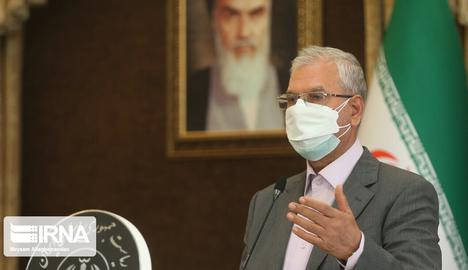On Tuesday, March 9, Iranian government spokesman Ali Rabiei declared that Iran was ready to take part in fresh prisoner exchanges with the United States.
Speaking at a weekly press conference in Tehran and quoted by Iranian Students News Agency (ISNA), the official stated that Iran was still waiting to see whether the Biden administration was committed to rejoining the Joint Comprehensive Plan of Action: the official title of the Iran nuclear deal. Any prisoner exchanges that had not taken place yet, he said, were due to US “unpreparedness”.
The two countries have a long history of mutually releasing prisoners in exchange for the return of their own. The Iranian-American dual nationals currently being held in Iran include Siamak and Baquer Namazi and the environmentalist Morad Tahbaz. But while their stories have repeatedly hit the headlines over the years, far less attention is paid in Iran to their Iranians counterparts in the US.
Last June, Iran’s release of American veteran and prisoner Michael White brought to light the curiously under-reported case of Dr Matteo Taerri: an Iranian-born cosmetic surgeon whose 16-month imprisonment in the States had gone completely unmentioned in the Islamic Republic prior to his exchange for White. This had followed the release of Xiyue Wang, a Chinese-American historian, in exchange for the Iranian scientist Masoud Soleimani in December 2019.
According to public records, there are at least 10 Iranian nationals currently in jail, awaiting sentencing or with ongoing restrictions on their movements and activities in the US. Who are they, and what are their stories? IranWire perused Department of Justice documents to find out.
Milad Kalentari
Nationality: Iranian
On December 21, 2015, Milad Rezaei Kalantari’s plane touched down at John F. Kennedy Airport, New York. The 31-year-old Iranian had won a free “green card lottery” to become a permanent resident of the US and planned to move to America. Instead, he was arrested at the airport by Homeland Security agents.
A probe into Kalantari’s activities had been launched in June 2014 after agents identified him as the leader of a global financial fraud ring. They then learned he had won the green card competition and was on the way to the States, and decided to apprehend him on arrival.
In October 2016, Kalantari admitted in a court in Gulfport, Mississippi to defrauding millions of US citizens by using hackers to steal their credit card information. According to the 12-page indictment filed against him in the US, the conspiracy had begun in 2005 and continued until January 2016. The stolen information was from customers of Hancock Bank, Keesler Federal Credit Union and Coastal Bank and Trust and included their card numbers, three-digit security numbers, names, addresses and telephone numbers.
All in all some 2.5 million people’s credit card details had been compromised, with an intended loss of US$1.2 billion. More than $35 million in actual losses were confirmed, including more than $26 million to Discover Card and almost $5 million to American Express.
On March 9, 2017, Kalantari was sentenced to 10 years in prison for access device fraud and five months in federal prison for conspiracy to commit identity theft and access device fraud, to be served concurrently. He is currently being held at Federal Transfer Center Oklahoma City and has also been ordered to pay $36.6 million in restitution.
Ahmadreza Mohammadi-Doostdar and Majid Ghorbani
Nationalities: Iranian-American/Iranian
In January 2020, Ahmadreza Mohammadi-Doostdar, a dual US-Iranian citizen, and Majid Ghorbani, 60, an Iranian citizen and resident of California, were sentenced to 38 and 30 months in federal prison respectively for spying on behalf of the Islamic Republic.
The pair were indicted in August 2018 in connection with covertly gathering information about groups considered enemies of the Iranian regime. They included a Jewish organization, the Rohr Chabad House in Chicago, and supporters of the Mojahedin-e Khalq (MKO) opposition group, also known as the People's Mojahedin Organization (MEK).
The Justice Department said Doostdar conducted surveillance on Rohr Chabad House in July 2017, including photographing the building’s security features, while Ghorbani attended an MEK rally in New York in September 2017 and took photographs of the participants, which he later passed on to Doostdar for a fee of about US$2,000 from the Iranian regime.
The photos and handwritten notes about the participants were found in Ghorbani's luggage at a US airport as he was returning to Iran in December 2017. Ghorbani had also attended an Iran Freedom Convention for Human Rights in Washington in May, where he again appeared to photograph speakers and attendees, and later spoke with Doostdar to discuss clandestine ways to deliver the information to Iran.
As part of his plea, Doostdar admitted under oath that he had traveled to the United States from Iran on three occasions in order to meet with Ghorbani and convey instructions from Ghorbani’s handlers in the Iranian government. Both entered guilty pleas to the charges against them.
Assistant Attorney General for National Security John C. Demers said at the time of the sentencing: “This case illustrates Iran’s targeting of Americans in the United States in order to silence those who oppose the Iranian regime or to otherwise further its goals.” Doostdar is currently in prison in Chicago, while Ghorbani has since been granted compassionate release due to ill health.
Behzad Pourghannad
Nationality: Iranian
Businessman Behzad Pourghannad formerly worked in Iran’s oil and gas industries and has $1.2 million worth of assets in Iran. The Iranian national, who is in his late 60s, was arrested in Germany in May 2017 on an Interpol red notice. He was later extradited to the US in July 2019 to face charges related to illegally exporting large amounts of carbon fiber to Iran together with a co-conspirator from the Revolutionary Guards (IRGC), in violation of international sanctions.
According to the Justice Department, between 2008 and 2013, Pourghannad had worked with Iranians Ali Reza Shokri – a member of the IRGC – and Farzin Faridmanesh to buy thousands of kilograms of carbon fiber from US manufacturers, mostly from a firm in Orange County, California. The group arranged to export the material to Iran through front countries registered in Tbilisi, Georgia and Dubai, United Arab Emirates (UAE), and falsified shipping records to disguise the contents with labels such as “acrylic” or “polyester”.
In November 2019 Pourghannad was sentenced to 46 months in prison for his part in the conspiracy. Explaining the indictment, the Assistant Attorney of National Security said carbon fiber was used by the Iranian regime “to further its nuclear, military, and aerospace programs”. Pourghannad’s defense attorney had previously said there was “no evidence” his client was a terrorist or endorsed the use of such weapons, and the amount of carbon fiber that actually found its way to Iran is unknown. He was granted compassionate release last August.
Mansour Arbabsiar
Nationality: Iranian-American
In a case that made headlines around the world, Mansour J. Arbabsiar, a used car salesman from Texas, was arrested in late September 2011 during a layover at JFK Airport and accused of plotting to murder Saudi Arabia’s ambassador to the United States.
The naturalized American citizen had tried to hire assassins from a Mexican drug cartel, Los Zetas, for $1.5 million in order to kill the ambassador, Adel al-Jubeir. Earlier in 2011 he had wired approximately $100,000 to a US bank account in anticipation of the murder being carried out.
Arbabsiar had previously traveled to Mexico on several occasions to meet with someone posing as a cartel member but who worked as an informant for the Drug Enforcement Administration. The pair talked about bombing a restaurant in the US that the ambassador frequented. When the informant noted that others could be killed in the attack, including US senators who dine at the restaurant, Arbabsiar dismissed these concerns as “no big deal”.
At the time of the arrest, Attorney General Eric H. Holder Jr. said the plot had been “directed and approved by elements of the Iranian government and, specifically, senior members of the [Revolutionary Guards’] Quds Force”. Arbabsiar later admitted to having a cousin in Iran who was a high-ranking member of the Quds Force and had recruited him, and to having met in Iran with Gholam Ali Shakuri, another senior officer in the Quds Force, in order to discuss the plot. The initial $100,000, he said, had come from the IRGC.
On May 30, 2013, Arbabsiar was sentenced to 25 years in prison for his role in the planned assassination. He had voluntarily waived his rights to remain silent or have a lawyer present during his interrogation in his first 12 days in custody, and offered a full confession. Speaking to the judge before his sentencing, the then-58-year-old said: “Whatever I did wrong, I take responsibility for it. I can’t change what I did.” He is being held at Federal Correctional Institution (FCI) Kazoo City in southern Mississippi, a medium-security facility.
Behrooz Behroozian
Nationality: Iranian-American
Behrooz Behroozian was born in Iran and moved to the US in 1976, becoming a naturalized US citizen in 1987. In October 2019, the then-64-year-old was sentenced to 20 months in prison by the US District Court for exporting gas and oil pipeline parts to Iran over a period of more than 10 years.
In November 2006, Behroozian had become the owner and operator of a computer parts supplier in Dublin, Ohio called Comtech International. The FBI established it had no storefront and rarely if ever sold computer parts. Instead Behroozian had been exporting manifolds, valves and connectors used for industrial pipelines in the gas and oil refinement industry to Iran, making an annual profit of between $35,000 and $40,000.
According to the sentencing memorandum filed in the case, Behroozian used a front company, Sumar Industrial Equipment, to cover up the fact that he was supplying equipment. FBI Cincinnati Acting Special Agent in Charge Joseph M. Deters said that for a decade, he had “willfully violated export control laws by sending dual-use items to Iran, furthering their military and economic capabilities... The sentencing is an example of the FBI's commitment to vigorously enforce laws designed to keep sensitive items out of the hands of nations and individuals hostile to the US.” Behroozian is currently in jail at FCI Cumberland, Maryland.
Mehdi “Eddie” Hashemi
Nationality: Iranian-American
A former resident of Los Angeles, Mehdi Hashemi, who sometimes went by the name Eddie Hashemi, was sentenced to 12 months in prison last June and is currently housed at Residential Reentry Management Long Beach, due to be released next month.
Hashemi was arrested at Los Angeles International Airport in August 2019 after returning to the country from Turkey. In December that year, he pled guilty to illegally supplying computer numerical control (CNC) machines, which are used to process raw materials such as metals, to Iran.
The indictment stated that Hashemi had made arrangements to ship the machines to the United Arab Emirates under “false and forged invoices and packing lists”, then arranged for them to be forwarded on to Iran on behalf of a Tehran-based company that claimed to be a textile and car part manufacturer. The 48-year-old was issued with a 12-month custodial sentence last June.
Sadr Emad-Vaez, Pouran Aazad and Hassan Ali Moshir-Fatemi
Nationalities: Iranian-American
California-based millionaires Sadr Emad-Vaez, Pouran Aazad and Ali Moshir-Fatemi were finally sentenced to prison terms in February this year in a complex case involving the violation of US sanctions by sending equipment to their car parts company in Iran.
Husband and wife Emad-Vaez and Aazad are the managing director and chief financial officer of the Ghare Sabz Company, otherwise known as GHS Technology, a manufacturer based in Tehran. Moshir-Fatemi is understood to be the engineering manager. The three were arrested in April 2018 for acquiring components for their company from all over the world, including the US, and sending them to Iran via the UAE. The Justice Department said they also “used elaborate systems of international wire transfers – including through prohibited financial institutions – to fund the effort”.
Prosecutors wrote in court records that the company supplies car parts to Iran’s biggest firms, and co-owns two real estate properties in Los Altos Hills and Palo Alto worth a cumulative total of $10 million. As part of their defense, Emad-Vaez’s lawyer said he had “strong ties” to the Bay Area and was actively involved in local charities, refurbishing a high school’s computer suite in the Bay Area and supporting the nonprofit Mothers Against Poverty.
Emad-Vaez and Aazad agreed to pay a $300,000 civil penalty to US authorities last year. In February Emad-Vaez was sentenced to 14 months in prison, Moshir-Fatemi received 12 months and a day and was fined $50,000 and Aazad received a one-year probationary period.
Amin Hasanzadeh
Nationality: Iranian-American
Engineer Amin Hasanzadeh is still awaiting trial in the US in connection with confidential documents he is alleged to have stolen from his American employer, Metro Detroit, while working as a defense contractor. The then-42-year-old was arrested in November 2019 following an FBI investigation, which concluded he had begun sending documents to his brother Sina Hasanzadeh in Iran just six days into his employment at the firm.
The court documents state Hasanzadeh was privy to extremely sensitive material, including a "real-time supercomputer with applications that would include aerospace applications”, and had sent hundreds of files including drawings and schematics to his brother. Sina Hasanzadeh is said to have worked at companies linked to the Iranian military, including Basamad Azma Company, which supports Iran's cruise missile program, and Bashir Industrial Complex (2013-2018), which is overseen by the Iranian Ministry of Defense.
Hasanzadeh also wrote on a 2010 visa application to enter the US that he had served as a lieutenant in the Iranian Air Force from February 2002 to December 2003. But he allegedly then denied his military service on subsequent immigration forms. In November 2019 a judge agreed he was a “flight risk” and denied his release on bond.
"We don't have any concerns that there is a current threat to the safety of the United States," FBI special agent Mara Schneider told Detroit News at the time.
Related coverage:
The Repercussions of Iran's Plot to Kill the US Ambassador to South Africa
The Curious Story of a Cosmetic Surgeon Exchanged for an American Prisoner
visit the accountability section
In this section of Iran Wire, you can contact the officials and launch your campaign for various problems





























comments